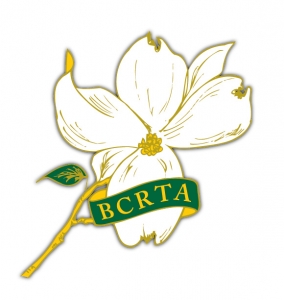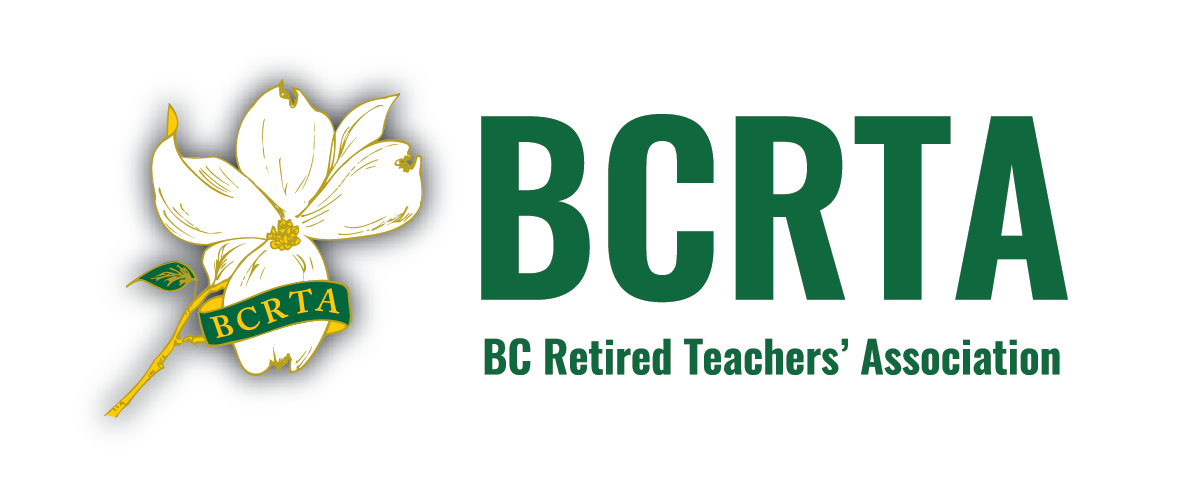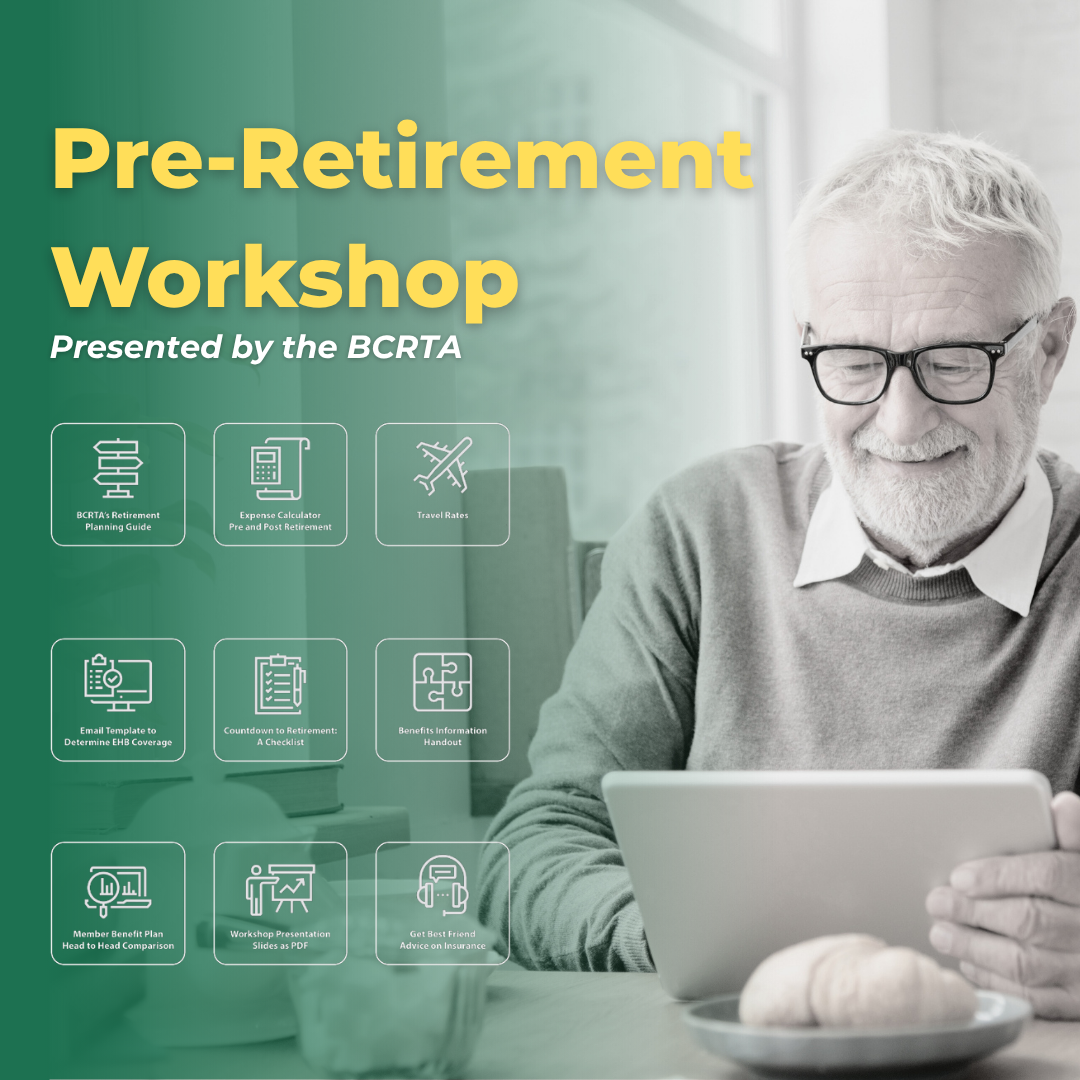As you get ready to file your 2023 taxes, please make note that the filing deadline this year is April 30, 2024.
Each year BCRTA prepares a basic guide to help our members make the most of your annual tax return. BCRTA does not offer income tax advice, but here are some common issues and deductions to keep in mind. Working through this list will help you complete your return to your maximum advantage. We will start with some new items of note for the 2023 tax year that may apply to you, then proceed to a handy checklist that is fine-tuned to apply to retirees.
Let’s get started!
New for the 2023 Tax Year
Tax Credit for Multigenerational Families Adding Suites for Seniors
New for this year’s tax returns is the multigenerational home renovation tax credit. This credit provides up to $7,500 to help you add a secondary suite to your home for older family members. To be eligible to claim this credit, a family member who is 65 years of age or older, or an adult eligible for the disability tax credit, must live in the suite.
Basic Personal Amount
The Canadian government has pledged to increase the Basic Personal Amount deduction over time until it reaches $15,000 for the 2023 tax year. Accordingly, the Basic Personal Amount for the 2023 tax year is $15,000.
Tax Free Savings Account Limit Increase
The Tax Free Savings Account contribution limit is $6,500 for the 2023 tax year. Learn more about lifetime limits and future annual limits at the link below
New OAS limit amounts and Increase for Those Reaching 75
Old Age Security payments give retirees a source of income to support their retirement. For those with income is over certain limit amounts, the OAS amount is reduced, and if your income is high enough, eliminated.
For the 2023 tax year individuals whose taxable income exceeds $86,912 will need to repay some of the OAS they received in 2023. If taxable income is over $142,609, individuals under 75 are not eligible to receive any OAS payments. For those 75 and over, the maximum income where some OAS eligibility continues is $148,179. Under CRA’s new “Affordability Plan”, seniors aged 75 and over received an automatic 10% increase of their Old Age Security pension, as of July 2022.
More Tax Preparation Tips
Teachers’ Pension Plan (TPP) Tax Information
Your tax information for your Teachers’ Pension Plan payments is all available on their website at “My Account”. A link is included on the TPP website at https://tpp.pensionsbc.ca
Click on “Official tax slips available for retired members”.
Eligible Medical Deductions
Any eligible medical costs that you pay that exceed 3% of your net income can be deducted when you complete your income tax return this year. A couple usually should combine all medical expenses on one tax return – usually the one with the lowest income – to gain the highest value deduction.
- Eligible medical expenses are those payments made by you or your spouse that were not fully reimbursed by an insurance plan. Some examples that you should explore:
- Prescribed medications
- Payments to a medical doctor, dentist, and most paramedical service providers such as physiotherapists, chiropractors, massage therapy, etc. You can review CRA’s complete list of medical expenses that may be eligible for tax deductions at this page on the Revenue Canada website..
- Premiums that you paid for any health service plan other than MSP.
- If you participate in BCRTA’s Johnson Insurance Prestige Travel Plan you should receive a letter that itemizes your claimable premiums as well as your claims history that shows your eligible deduction. If you don’t see this by March 16, follow up with them.
- If you participate in BCRTA’s MEDOC travel insurance plan and have requested a letter that shows the eligible amount of premiums in a previous year you should receive it soon. This year’s tax notices are scheduled to be sent out in February. If you are a MEDOC participant but have never requested this notice, call Johnson at 1.800.563.0677 and you will automatically receive one every year.
- If you are signed up for Extended Health Coverage with Green Shield and premiums are deducted from your Teacher’s Pension Plan payments, GSC premiums are always shown in Box 135 of the T4 you received from TPP. See more about tracking GSC claims at https://www.bcrta.ca/gscclaims
BC Recovery Benefit and the one-time payment for people receiving Old Age Security and Guaranteed Income Supplement.
Both the BC Recovery Benefit and the Federal one-time payment for seniors programs have been closed. If you received either of these during the eligible period, remember that they are tax-free payments. You do not need to report them on your income tax form.
The Canada Caregiver Credit
The Canada Caregiver Credit (CCC) is a non-refundable tax credit that may be available to you if you support a spouse, common-law partner or a dependent with a physical or mental impairment. For detailed information visit https://www.canada.ca/en/revenue-agency/services/tax/individuals/topics/about-your-tax-return/tax-return/completing-a-tax-return/deductions-credits-expenses/canada-caregiver-amount.html.
Disability Tax Credit
The disability tax credit (DTC) is a non-refundable tax credit that helps persons with disabilities or their supporting persons reduce the amount of income tax they pay. For detailed information visit https://www.canada.ca/en/revenue-agency/services/tax/individuals/segments/tax-credits-deductions-persons-disabilities/information-medical-practitioners/eligibility-criteria-disability-tax-credit.html.
Age tax Credit
If you were 65 or older on Dec. 31, 2023 you may claim an age tax credit. The credit is geared to income with the maximum discount for those whose income is less than $98,309. You will get the full credit if your income is $42,335 or less, and the credit is gradually eliminated as your income increases. There is a corresponding provincial tax credit as well. This deduction can also be transferred to a spouse. For detailed information visit https://www.canada.ca/en/revenue-agency/services/tax/individuals/topics/about-your-tax-return/tax-return/completing-a-tax-return/deductions-credits-expenses/line-301-amount.html.
Seniors Renovation Tax Credit (BC)
We know that people who continue to live independently enjoy many benefits, but changes may be required to your residence to enable you to stay in your home. If you are a senior who has made modifications to your home for accessibility reasons you may qualify for the British Columbia Home Renovation Tax Credit for Seniors and Persons with Disabilities. Use form 5010-S12 Schedule BC(S12) to apply for this credit.
Source: https://www2.gov.bc.ca/gov/content/taxes/income-taxes/personal/credits/seniors-renovation
Charitable Donations
Tax credits are available for donations made to registered charities. In a spousal relationship, the claim can be split or attributed to either person to provide the greatest tax advantage. For detailed information see https://www.canada.ca/en/revenue-agency/services/charities-giving/giving-charity-information-donors/claiming-charitable-tax-credits.html.
Political contributions
Tax credits are available for any contributions you and your spouse made to registered federal political parties or British Columbia political parties. For more information about the federal credit visit https://www.canada.ca/en/services/taxes/income-tax.html.
For British Columbia credits go to https://www.canada.ca/en/revenue-agency/services/tax/businesses/topics/corporations/provincial-territorial-corporation-tax/british-columbia-provincial-corporation-tax/british-columbia-political-contribution-tax-credit.html.
Home Accessibility Tax Credit Increases
The annual expense limit of the home accessibility tax credit is $20,000. This can be claimed by anyone with an eligible dwelling over 65 who remodeled their home for safer access, or in some cases by a spouse or relative who is funding the project.
Source and more info: https://www.canada.ca/en/revenue-agency/services/tax/individuals/topics/about-your-tax-return/tax-return/completing-a-tax-return/deductions-credits-expenses/line-31285-home-accessibility-expenses.html.
Payment Options
If you are among the 16% of Canadians that owe tax after filing, you now can pay using a credit card, PayPal, or Interac e-Transfer (See Payments to the Canada Revenue Agency on the CRA website).
Sign up for Direct Deposit with your Revenue Canada account to receive your refund deposited into your bank account. Learn more, log in or register via this page on Revenue Canada’s website.
Other Options
You can now also file a return electronically on CRA’s website. You will have to register on the CRA website MY Account service to do this. Once you have registered, you can take advantage of CRA’s “Auto-fill My Return” Feature, which will speed up the entry of information.
Need Help Filing Your Return?
Using commercially available tax filing software can make the process of doing your taxes less stressful. With helpful calculations, guides and prompts regarding eligible deductions and required forms, using tax filing software will be, for most people, quicker and more accurate than traditional methods using a pen, paper and two pots of coffee. Many software offerings allow several filings on one license, meaning you can cover the people in your household with one purchase. A computer-literate relative might help. Filing as a household with your spouse is made easier, as most personal tax software automatically calculate the best tax-splitting options for couples. Another benefit is that programs will keep track of your filings for one tax year and provide continuity for future filing.
There are several low-cost or free tax filing programs available on-line. Search for “on-line tax filing.” A listing provided by CRA can be found by visiting https://www.canada.ca/en/revenue-agency/services/tax/individuals/community-volunteer-income-tax-program.html.
There are also many volunteer run tax preparation clinics at Seniors’ and Community Centers around the province.
File by Phone
CRA’s SimpleFile by Phone (formerly File My Return) is a free, easy-to-use and secure telephone service to help people with a simple tax situation file their taxes by phone.
With SimpleFile by Phone, you can complete your tax return from the comfort of your own home 21 hours a day, from 6:00 a.m. to 3:00 a.m. ET, 7 days a week.
Direct Deposit
But no matter how you file your taxes, signing up for direct deposit is the fastest way to receive your benefits, credits and tax returns.
CRA Scams
We always remind members that there are unfortunately a lot of fraudsters who try to take advantage of seniors by pretending to be a collection agency or government official. Often these are strange recorded calls, or sometimes it will be a person phoning you.
By being alert to fraud, you won’t fall for fake phone calls, e-mails or letters pretending to be from the CRA. Canada Revenue Agency will never contact you demanding your credit card number. If you receive one of these contacts, it is important to provide NO information.
To ensure that you are dealing with an authorized CRA representative, always follow up on any questions you have by calling 1-800-959-8281 or check your CRA My Account on-line.
Your Receipts
Make sure you have all your receipts before you file. That includes both income (T4 and T5) and medical and charitable expense receipts. It feels good to file, but don’t jump the gun and send in an incomplete tax filing. If you collect a pension from the Teachers’ Pension Plan but haven’t yet received your T4A form from the TPP, you can contact them at 1-866-876-8877.
Still Working? What You Need to Know About CPP Choices for 65-70 Year Olds
From age 65 to 70, an employee can elect to stop making further contributions to the CPP, by completing form CPT30 from CRA. Once the form is completed, a copy must be given to the employer, and the original sent to CRA. The election would take effect on the first day of the month following the month that the form is filed with the employer, so cannot be backdated. The first day that the form can be completed is the day that the employee turns 65, so CPP contributions are still made for the birthday month.
Digital News Subscription Credit
The digital news subscription tax credit is a non-refundable tax credit for amounts paid by individuals to a qualified Canadian journalism organization (QCJO) for qualifying subscription expenses after 2019 and before 2025. Individuals who have entered into an agreement with a QCJO for a qualifying subscription that is eligible, can claim the credit on Line 31350 of their T1 Income Tax and Benefit Return for the years 2020 to 2024.
Medical Expenses Refund Supplement
If your adjusted family net income is less than $58,944 and your employment income is above $4,083 or more, you may qualify for this supplement.
Cryptocurrency Reporting
Many individuals are dabbling in Bitcoin and other “crypto”. There is a popular culture around cryptocurrencies such as Bitcoin that they live in a universe free of taxation and reporting. Not so. There can be serious penalties for those who do not report holdings. For example, see this article regarding the filing requirements for cryptocurrencies that are considered foreign property: https://www.taxtips.ca/filing/foreign-asset-reporting.htm#cryptocurrency-may-be-foreign-property
Canadian Dividends Versus Other Investment Income
If you have income streams from investments, this article explaining how Revenue Canada treats different forms of investment income might help you plan to structure your holdings in the future. See https://www.taxtips.ca/dtc/taxcomparisons/tax-comparison-senior-2023.htm



